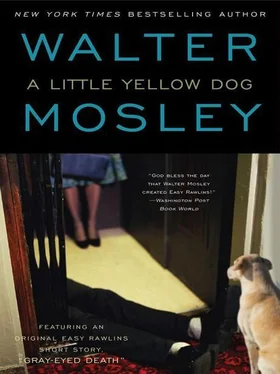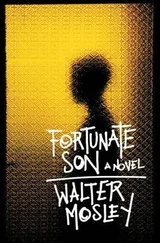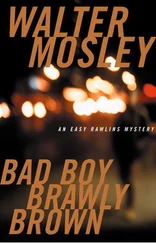Like hell.
“Then you don’t have a thing to worry about, Mr. Langdon. Not a thing.” I slapped him on his shoulder. He winced and winked and tried to laugh.
“Did you want something, Mr. Rawlins?”
“No. Why?” I asked innocently.
“Why did you call me?”
“No reason.” I smiled. “I just haven’t said good morning to you in a long time.” Lying is mainly achieved by the tone in your voice. If you sound like you mean what you say, most people will believe you.
Mr. Langdon believed me.
I watched him go down the hall, pillow-punching children and adults alike with his girth.
The administration office was a big room of oak and cream. A yard-high wooden wall separated the outside world from the secretaries who ran Sojourner Truth. The seven secretaries had four desks behind which stood a row of shallow offices. Between each office and the next sat two large filing cabinets. The women moved from desk to desk and cabinet to cabinet like bees in a hive. Every now and then one of them would duck into a door and make a call or type a letter. Trudy Van Dial puffed cigarettes behind a closed door now and then because she was addicted to both work and nicotine and couldn’t bear to take the time to go down to the teachers’ lounge.
Gladys Martinez, a fifth-generation Mexican-American Los Angelena, was office head. Gladys was a good-natured woman. She usually had a smile and a story whenever we talked, but that day she didn’t even answer my question.
I asked her if Mrs. Turner was coming in that morning. She just turned her back to me and said, “Joanna, I need some staples up here.” She kept her back to the front desk for a while. When she turned around and saw me still standing there she smiled, raised her shoulders to indicate her helplessness, and then hurried into a back office.
I didn’t run out of the front door. I didn’t get into my car and drive out of the state with my children. I didn’t, but I should have.
The main office was clear of custodians when I got there. The painters were sitting around waiting for their tarps and rollers to be delivered. The plumbers were there with a final plea for me to sign off on tearing out the boiler-room floor — I refused them and they left to figure out another way to change the pipes under the school.
“What’s happening with that killing, Rawlins?” Conrad Hopkins, a watery-eyed painter from Detroit, asked me. Some of the craftsmen liked to feel important. A few had annoying habits, like not calling me mister. Hopkins was especially obnoxious because of the high-handed tone he took. He was an older man, more washed out than white.
“I don’t know a thing about it.” I lied to him because keeping in practice keeps you alive.
“They’re all over the garden, and I hear that they took over Teale’s office for questioning people,” Hopkins said.
Mrs. Teale was the girls’ vice principal; she had an office on the second floor of the administration building.
“It was probably drugs,” one of the younger painters said. He put a cigarette to his lips and held his hand out with authority. “Cases like this it usually is.”
“You don’t know shit, Hank,” Hopkins said.
The other men laughed while the painter named Hank looked around trying to hide his humiliation. In the crowds I’d once run in, Hopkins would have had to back up his words with fists; sometimes the street has it over the office.
I sat down at my desk to go over the quarterly vacation requests. That’s when I noticed the pink slip from up the hill informing me that Simona Eng had called in sick.
The workmen hung around talking and drinking coffee. They took longer breaks, but at the end of the day their work had to be done, so I didn’t try to push them. I just filled out my progress reports and made recommendations to the area supervisor, Bertrand Stowe.
Soon after the nine-forty class bell rang, the door to the main office was flung open. Sanchez came in with two uniformed white cops. The plumbers and painters were struck dumb. Maybe they thought that they’d be arrested for slacking off on the job.
“Excuse us, sirs,” Sanchez said to the men. “But Mr. Rawlins and I have some police matters to talk about.”
They cleared the room in seconds.
It took Sanchez half a minute to come sit at my desk. He and his goons knew their script by heart. Policeman number one started looking around the shelves and at the papers on the table while policeman number two positioned himself close to me, just in case I got the notion to run. Sanchez in the meanwhile chose a chair, shook it for no reason that I could tell, and then dragged it over to my desk. Before he sat down he took out a new pack of Kools and tamped it hard against the heel of his palm. He pulled the red strip on the cellophane wrapper and tore the aluminum paper from one side of the pack. He gestured the cigarettes toward me as an offer. I declined and so he put the pack away without taking out a cigarette for himself.
I don’t remember being frightened. I was so concentrated on him and what he did that there was no room for feeling.
He hadn’t shaved that morning and his brown suit was rumpled. His breath was coming quicker than mine and there was dirt under his chipped nails. He had on a violet tie with a knot that even Jesus would have done over. All of that made the sergeant look vulnerable, like he was human. But his eyes were none of that. I’ve been told that there’s no such thing as truly black eyes but Sergeant Sanchez’s small orbs were no other color. They were animal eyes. And I was lost in the woods.
“You know Lieutenant Lewis?” he asked. He straddled the chair backwards, leaning his chest against the backrest.
I didn’t trust my voice not to crack.
“Arno Lewis,” he said. “From the Seventy-seventh Street station.”
“What about’im?”
“I thought I recognized you in the garden yesterday, Rawlins. I’ve been at the Seventy-seventh for eight years. A long time ago I saw you, but I didn’t remember what you were there for. I talked to Lieutenant Lewis this morning.” Sanchez proved that he could smile and scrutinize at the same time. “He likes you.”
It almost sounded like a proposition.
“But,” Sanchez sighed, “with friends like him your enemies would see you hung up by the balls.”
It was a simple trick. He knew about the times I had been in jail and the kinds of people that I’d been involved with. What he wanted was for me to confess to that history without him actually mentioning anything. That way I would be in the position of confessing to him, telling him things without him having to ask.
“We take our friends where we can,” I said. He was going to have to do better than that if he wanted to hogtie me.
“You were looking for Idabell Turner this morning.”
“I what?”
“Mrs. Turner,” Sanchez said. “You asked about her in the main office this morning. Mrs. Martinez mentioned it.”
“I did?”
“You were asking for the victim’s name yesterday.”
“No,” I said.
“Well, you asked if I’d found out the victim’s name.”
I didn’t have to answer that.
“His name was Roman Gasteau,” Sanchez continued. “Twin brother of Holland Gasteau.”
Sanchez’s eyes were saying, loud and clear, that I knew what he was talking about. They were inviting me to enter into the conversation.
But I refused.
“Why’d you ask about Mrs. Turner this morning, Mr. Rawlins?”
“She’s a friend’a mines. I heard her dog got killed or somethin’.”
“If she’s such a good friend, why didn’t you call her house?”
“I did. She wasn’t home,” I said. “What’s this all about?”
“Where were you last night, Mr. Rawlins?”
Читать дальше












